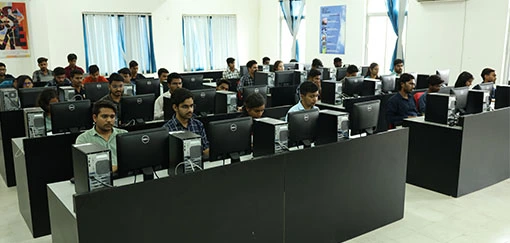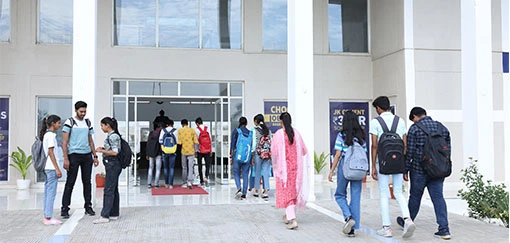About M.Sc. in Applied Physics
The Department of Physics offers postgraduate M.Sc. in Applied Physics (with specialization in Atomic and Molecular Physics/Non-linear Dynamics/Nanotechnology/Renewable Energy) degree programme with an objective to enhance the fundamental knowledge as well as experimental, computational and analytical skills of the students. The mode of teaching is mainly learning by doing and experiencing.
Department has well equipped computational research laboratory and well qualified faculty members and is highly involved in research (Average experience of faculty members is more than 15 years).
Mode
- Regular
Specialisation Offered
- Atomic and Molecular Physics
- Non-linear Dynamics
- Nanotechnology
- Renewable Energy
Curriculum
Semester 1
Semester 2
Semester 3
Semester 4
Semester 1
| Course Code | Course Title |
|---|---|
| Major Core | |
| PHE4101 | Mathematical Physics |
| PHE4102 | Classical Mechanics |
| PHE4103 | Elementary Quantum Mechanics |
| PHE4104 | Physics Laboratory – I |
| PHE4105 | Introduction to Electronics |
| MAE4101 | Research Methodology |
| Skill Enhancement Courses | |
| SEXXXXX | Skill Enhancement Course |
| Value Added Courses | |
| VAXXXXX | Value Added Course |
Semester 2
| Course Code | Course Title |
|---|---|
| Major Core | |
| PHE4201 | Statistical Physics |
| PHE4202 | Electrodynamics |
| PHE4203 | Physics of Semiconductor Devices |
| PHE4204 | Solid State Physics |
| PHE4205 | Physics Laboratory – II |
| MAE4203 | Computational Techniques for Physicists |
| Skill Enhancement Courses | |
| SEXXXXX | Skill Enhancement Course |
| Value Added Courses | |
| VAXXXXX | Value Added Course |
Semester 3
| Course Code | Course Title |
|---|---|
| Major Core | |
| PHE4301 | Advanced Quantum Mechanics |
| PHE4302 | Nuclear & Particle Physics |
| PHE4303 | Physics of Laser and Laser Applications |
| PHE4304 | Physics Laboratory – III |
| Discipline Specific Elective | |
| Non-linear Dynamics | |
| PHE4361 | Nonlinear Dynamics |
| Theoretical Atomic & Molecular Physics | |
| PHE4371 | Theoretical Atomic & Molecular Physics |
| Nanotechnology | |
| PHE4341 | Physics of Nanostructure and Nanomaterials |
| PHE4342 | Nanoelectronics and Nanodevices |
| Renewable Energy | |
| PHE4351 | Science and Technology for Renewable Energies |
| PHE4352 | Solar Energy: Principles of Solar Thermal Devices |
| Project/Internship/Workshop/ Vocational Training | |
| PHE4384 | Summer Internship |
Semester 4
| Course Code | Course Title |
|---|---|
| Research Project/Dissertation/Industrial Training | |
| PHE4485 | Dissertation |
PSo
PSO1: Understand principles of physics for the scientific phenomena in the classical domain and apply inter-disciplinary concepts and for understanding and describing the natural phenomena.
PSO2: Provide exposure to modern experimental/theoretical methods for measurement, observation and fundamental understanding of physical phenomena/systems. Engage in research and life-long learning to adapt to changing environment.
Pathway After
M.Sc in Applied Physics
Careers
Research/internship/fellowship opportunities in academics & scientific institutes like DRDO, TIFR,BARC,DAE,CSIR,ISRO etc. it will also help the students to qualify the competitive exams like NET-JRF, GATE, JEST etc.
Top Recruiters
Research Institutions and Laboratories :
- Tata Institute of Fundamental Research (TIFR)
- Bhabha Atomic Research Centre (BARC)
- Indian Space Research Organisation (ISRO)
- Indian Institute of Science (IISc)
- National Physical Laboratory (NPL)
Government Sector :
- Indian Oil Corporation (IOCL)
- Bharat Heavy Electricals Limited (BHEL)
- Defence Research and Development Organisation (DRDO)
- Public Sector Banks for roles related to data analysis and risk assessment.
Academic Institutions :
- Many universities and colleges hire MSc Physics graduates as faculty members or research assistants.
Private Sector :
- Information Technology (IT) and Software Companies for roles related to data science, analytics, and software development such as Tata Consultancy Services (TCS)
- Infosys, Wipro, HCL Technologies etc.
- Telecom Companies for roles in research and development.
- Oil and Gas Companies for roles related to geophysics and exploration.
- Electronics and Semiconductor Companies.
Defence and Aerospace :
- Companies like Hindustan Aeronautics Limited (HAL) and private aerospace firms may have opportunities for physics graduates in research and development roles.
Market Research Firms :
- Companies like Nielsen, Kantar, and others often hire individuals with strong analytical and research skills, which physics graduates often possess.
Dr. Prithvi Singh
Associate Professor and Head Department of Physics
Welcome to the Department of Physics at Sir Padampat Singhania University, Udaipur. The department was established in 2007 with a state of art facilities and highly qualified faculty.
The Department has Internationally recognized research in the areas of Atomic and Molecular Physics, Nonlinear Dynamics , Nanomaterials and Renewable energy producing an average of two international SCI journal articles per faculty per year.
The Department faculty members have research collaboration with Max Planck Institute, Germany, CNRS France, MST University, USA, Renne University France etc.
The Department faculty has served as visiting/guest scientists at different Universities/Institutes such as ICTP Italy, Max Plank Germany, ITAMP Harvard, MIT, USA, CNRS, and France etc.
The Department faculty members have received external research Project Grants & Travel Grants from various national / international funding agencies like DST, CSIR, INSA, CCSTDC, NBHM, GRC, IUPC, Nature Publishing Group, CIMPA, ICIAM, ICM etc and various Universities/ Institute abroad.
The department also offers Ph.D Programme in the areas of expertise of its faculty members.

Why M.Sc. in Applied Physics
From SPSU

Top Placements at Lucrative Packages.
Exposure to real-world projects

Project-based learning and skill-oriented pedagogy.
Internship opportunities with leading MNCs

Industry-ready curriculum and syllabi.
Experienced and industry-renowned faculty
Our Alumni Working with Fortune
500 Companies



























M.Sc. in Applied Physics
Eligibility Criteria & Selection Process

Selection
M.Sc. in Applied Physics
Selection will be based on merit of
Candidate must have passed graduation or its equivalent position
Scholarship
worth ₹22Cr
- Additional 5% for wards of defence & para-military personnel
- Additional 5% for girl child
- Additional 5% for state, national & international sports players
- Additional 5% for JK employees wards only
- Additional 5% siblings of existing students or alumni (blood relation only)
- Additional 5% for MBA applicants with CAT & XAT percentile of over 85, or GMAT score of above 650
- Additional 5% for M.Tech. applicants qualifying GATE
JK Cement Scholarship worth ₹35Cr
Merit Based Scholarship UG Programs
=98% in Xth & Xllth
100% Scholarship
100% Scholarship
>=95% & <98% in Xth & Xllth
75% Scholarship
75% Scholarship
>=90% & <95% in Xth & Xllth
65% Scholarship
65% Scholarship
>=80% & <90% in Xth & Xllth
55% Scholarship
55% Scholarship
>=70% & <80% in Xth & Xllth
45% Scholarship
45% Scholarship
>=60% & <70% in Xth & Xllth
35% Scholarship
35% Scholarship
>=50% & <60% in Xth & Xllth
25% Scholarship
25% Scholarship
JK Cement Scholarship worth
₹35
Crore
Crore
Engineering Program
Merit Based Scholarship PG Programs
=98% in in Xllth & Graduation
100% Scholarship
100% Scholarship
>=95% & <98% in Xllth & Graduation
75% Scholarship
75% Scholarship
>=90% & <95% in Xllth & Graduation
65% Scholarship
65% Scholarship
>=80% & <90% in Xllth & Graduation
55% Scholarship
55% Scholarship
>=70% & <80% in Xllth & Graduation
45% Scholarship
45% Scholarship
>=60% & <70% in Xllth & Graduation
35% Scholarship
35% Scholarship
>=50% & <60% in Xllth & Graduation
25% Scholarship
25% Scholarship
Student Testimonials

MOHIT CHOUDHARY
Intellipaat Software Solutions Pvt. Ltd, Bengaluru Karnataka
I am Mohit Choudhary a pass-out of 2022 batch from SPSU and in my final year I got placement while studying, So currently working with Intellipaat Software Solutions Pvt. Ltd. located at Bengaluru Karnataka, as a senior business devoloper associate. I can never forget the contribution of CSE dept., my faculties and the placement cell towards helping me develop those crucial skills which are required to have a successful corporate life, not just the technical knowledge but also the infrastructure and student forums, helped me to step out my comfort zone and gave me the opportunity to apply what all i have learnt at SPSU. It has also enhanced my skills from all the aspects such as in building up.

T. CHANDRA SEKHAR
Harman connected services, Bangalore, India
I am T.Chandra Sekhar graduated from Sir Padampat Singhania university in Computer science and Engineering of Batch:2018-2022. I am currently Working in Harman connected services, Bangalore, India. As a Associate software engineer -Product development. HARMAN is a global leader in connected car technology, lifestyle audio innovations, professional audio and lighting solutions, and digital transformation.
Firstly, I am thankful to SPSU, for offering a wonderful opportunity to communicate with faculty as it was a completely residential campus. The relationship between faculty and students is soo good, they treat like their children’s especially when we are sick, they take care as their family people.

ABHISHEK GUPTA
Cognizant Technology PVT LTD at Pune Maharashtra
I am Abhishek Gupta, completed B. Tech CSE(IoT) in 2021 from SPSU, currently working with
Cognizant Technology PVT LTD., as a software Engineer. located at Pune Maharashtra.
SPSU is a practical technical institute and offers an ideal study environment for those who want
experience both professionally and educationally. I learnt leadership, management and
technical skills during my graduation. I am thankful god to provide me such a excellent institute
where I got so many mentors, faculties who were always ready to help not only in study but also
to learn moral values.

Hanisha Reddy
2018-2022
I'm really glad to be part of SPSU. The main reason behind my current position in top most company is the placement team and all my lectures who gave me an incredible support right from the first step.
Four years in college taught me plethora of things. The best thing is getting equal encouragement from the management both in studies and extra curricular activities.
I am delighted to welcome all the upcoming students who are going to have a great future ahead.
M.Sc. in Applied Physics
Frequently Asked Questions
MSc Physics is a postgraduate degree program that focuses on advanced topics in physics. It provides in-depth knowledge of various branches of physics.
Eligibility criteria can vary between universities, but typically, candidates should have a bachelor’s degree in physics or a related field with a minimum specified percentage or CGPA.
MSc Physics programs in India are typically two years long, consisting of four semesters.
Specializations can vary, but common ones include Theoretical Physics, Experimental Physics, Condensed Matter Physics, Astrophysics, and Nuclear Physics, Reneveble energy etc..
The curriculum usually includes subjects such as Quantum Mechanics, Electromagnetism, Thermodynamics, Statistical Mechanics, and various specialized courses depending on the chosen specialization.
Many MSc Physics programs include a research component where students work on a research project or thesis in their chosen specialization.
Graduates can pursue careers in research, academia, government laboratories, private industry, data science, finance, and more. The career path depends on the specialization and individual interests.
While a bachelor’s degree in physics or a related field is common, some universities may admit students from diverse backgrounds if they meet certain prerequisites.
MSc Physics is a general program covering fundamental physics principles, while MSc Applied Physics often focuses on the practical application of physics in engineering and technology.
MSc Physics graduates can contribute to cutting-edge research in various fields, including materials science, nanotechnology, renewable energy, and space exploration.
Yes, many students opt to pursue a Ph.D. in Physics or a related field after completing their MSc to further specialize and engage in advanced research.



